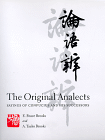- THE ORIGINAL ANALECTS
- by Bruce & Taeko Brooks, Columbia University Press, 1998.
This
book has challenged the traditional idea that the Analects mostly
contains sayings of Confucius himself. The traditional view
is held for example by Simon Leys:
- "The Analects
is the only place where we can actually encounter the real,
living Confucius. In this sense, the Analects is to Confucius
what the Gospels are to Jesus. The text, which consists of a
discontinuous series of brief statements, short dialogues and
anecdotes, was compiled by two successive generations of disciples
(disciples and disciples of disciples), over some seventy-five
years after Confucius's death-which means that the compilation
was probably completed a little before, or around, 400 B.C.
The text is a patchwork: fragments from different hands have
been stitched together, with uneven skill-there are some repetitions,
interpolations, and contradictions; there are some puzzles and
countless loopholes; but on the whole, there are very few stylistic
anachronisms: the language and syntax of most of the fragments
is coherent and pertains to the same period." (Simon Leys,
The Analects of Confucius)
-
- To the Brooks, the oldest core
is chapters 4 to 9. It is still close to Confucius' original
thought and was finished around 400 BC by the first two generations
of disciples. The other chapters were added later, during a
period of 150 years, by successors who were members of the Kong
family. Confucius had emphasized the importance of cultivating
ren (humanity), whereas those later successors made li
(social ritual) the essential value. To highlight their newer
ideas, they placed three of their later chapters at the beginning
of the book.
- REVIEWS
:
Mansvelt Beck, in IIAS Newsletter (Dec. 1998)
- John Makeham, in
China Review International (Spring 1999): in 2 parts
- Fred Contrada, in the Union-News (May 1999)
- John B. Henderson, in
the Journal of Asian Studies (August 1999)
- T.C. Kline, in Pacific
Affairs (Summer 1999)
- Whalen Lai, in Asian
Philosophy (November 1999)
- Edward Slingerland, in Philosophy East & West
(January 2000)
|
-
-
-
-
-
-

|